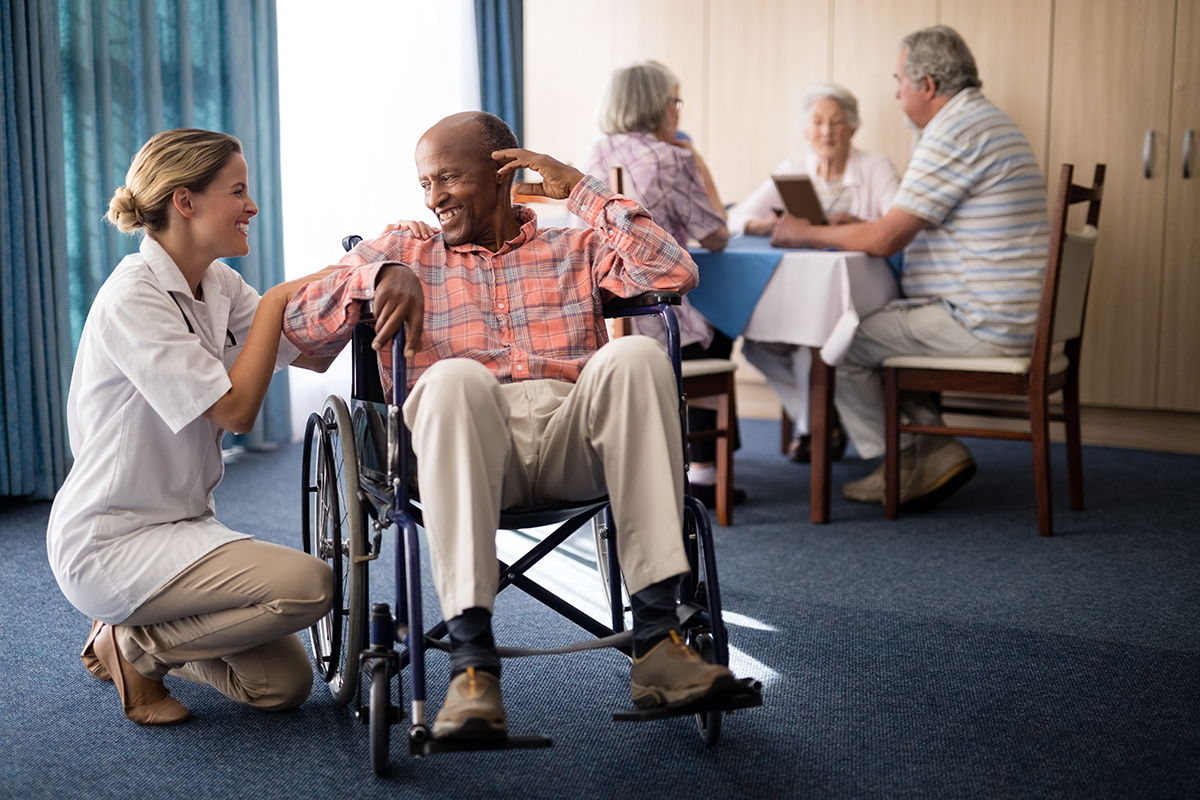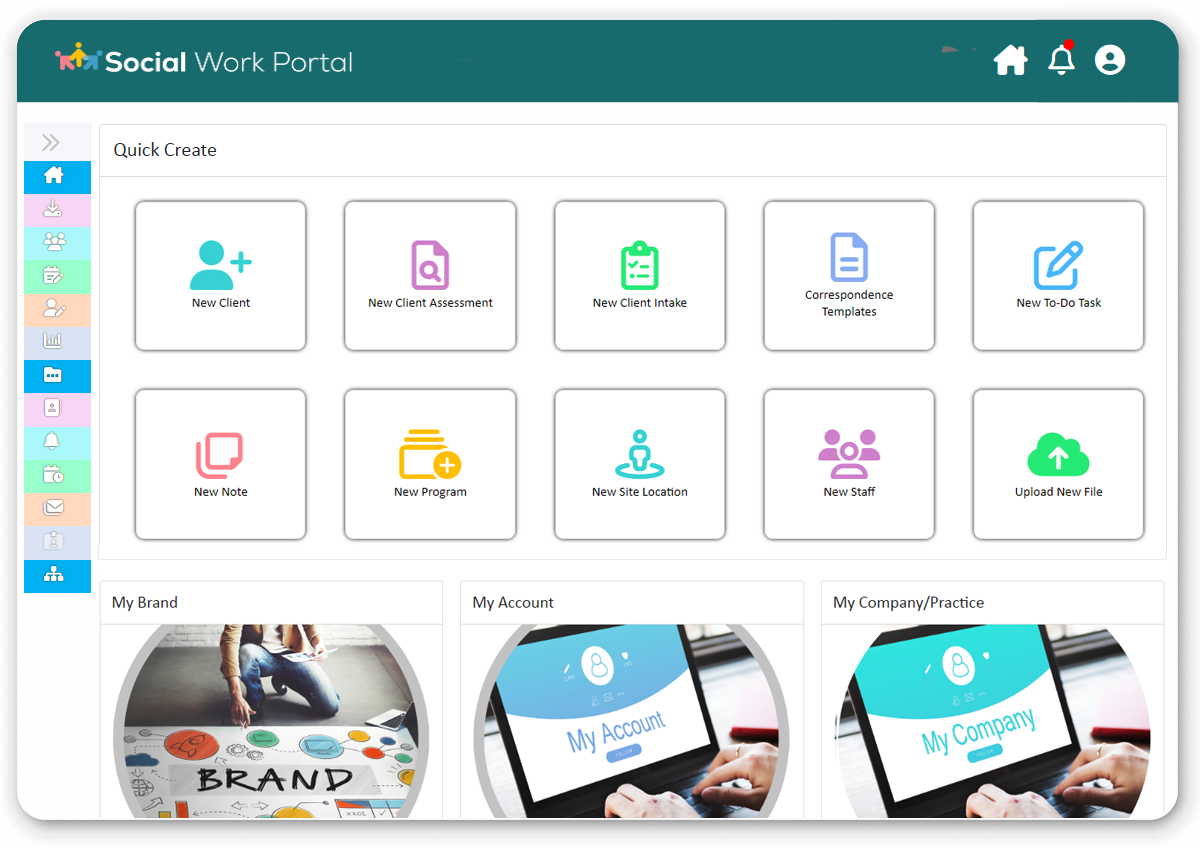Exploring the Role of a Social Worker in Disability & Rehabilitation
Welcome to a world where compassion meets empowerment, where resilience fuels transformation, and where every small step creates ripples of change. If you’re drawn to making a profound impact on the lives of individuals with disabilities, then disability and rehabilitation social work may be your calling.
Imagine being the bridge between adversity and possibility. Picture yourself advocating for accessible services, empowering individuals to reclaim their independence, and championing inclusion. Whether you’re a recent graduate or someone seeking a purpose-driven career shift, this guide is your compass.

Below, we’ll delve into the world of the rehabilitation social worker, equipping you with the foundational knowledge and essential skills to launch a rewarding career in this dynamic field.
Watch a summary below:
Story Highlights
|
What is Rehabilitation in Social Work Practice?
Disability and rehabilitation social workers play a vital role in supporting individuals with disabilities throughout their rehabilitation journeys. They work in a variety of settings. Types of rehabilitation in social work jobs include:
- Hospitals and Rehabilitation Centers: A rehab social worker helps patients adjust to their disabilities, develop coping mechanisms, and connect with appropriate resources after discharge.
- Community-Based Programs: social work and rehabilitation professionals provide support and advocacy to individuals with disabilities living in the community, assisting them with independent living skills, employment, and social integration.
- Schools: A disability and rehabilitation social worker works with children and adolescents with disabilities. They collaborate with educators and families to ensure their educational needs are met and promote inclusion.
- Mental Health Agencies: Rehab social workers provide counseling, support groups, and case management to individuals with disabilities who are also experiencing mental health challenges.
Key Role of a Social Worker in Disability & Rehabilitation
The specific duties and role of a social worker in rehabilitation and disability can vary depending on the setting. However, some core responsibilities of the rehabilitative function of social work include:
Conducting Assessments
Rehabilitation social workers assess the needs, strengths, and challenges of individuals with disabilities to develop individualized support plans. Some of the common types of assessments used in social work and rehabilitation are:
- Functional Assessments
- Mental Health Assessments
- Vocational Assessments
- Multimodal Assessments
You can find more details about assessments for the rehabilitative function of social work in the APA’s Guidelines for Assessment and Intervention with Persons with Disabilities.
Providing Counseling and Support
The role of a social worker in rehabilitation can include offering individual and group counseling to address emotional and social challenges associated with disability. This is often included in the role of a social worker in community-based rehabilitation.
Social Skills Development
A disability and rehabilitation social worker may assist individuals with disabilities in developing social interaction skills and promoting social integration.
Resource Navigation
Connecting individuals with essential resources like housing assistance, assistive technologies, vocational training programs, and transportation services is crucial. It’s a core function of the role of a social worker in disability & rehabilitation.
Advocacy and Empowerment
Social workers advocate for the rights of individuals with disabilities and empower them to make informed choices about their lives. A rehab social worker may advocate on the patient’s behalf when collaborating with others on the patient’s care team or government agencies.
Collaboration
Collaboration with healthcare professionals, therapists, educators, and family members is essential for providing holistic support in social work and rehabilitation.
Do you have any questions about the role of a social worker in community based rehabilitation. Please reach out and let us know.
Different Types of Rehabilitation in Social Work
Disability and rehabilitation social workers may specialize in specific types of rehabilitation, including:
- Physical Rehabilitation: Assisting individuals with physical limitations to regain functional skills and independence.
- Vocational Rehabilitation: Helping individuals with disabilities secure employment through job training and placement programs.
- Cognitive Rehabilitation: Supporting individuals with cognitive impairments to improve memory, problem-solving skills, and daily living skills.
- Psychological Rehabilitation: Helping individuals with mental health conditions develop coping mechanisms and manage their symptoms.
Essential Skills for Rehabilitation in Social Work
To thrive in the role of social worker in rehabilitation, you’ll need a strong foundation in social work theory and practice, along with specific skills tailored to supporting individuals with disabilities. Here are some key areas to develop:
- Disability Knowledge and Awareness: Understanding various types of disabilities and their impact on individuals’ lives is crucial.
- Communication Skills: Effective communication, including active listening and sensitivity to diverse communication styles, is essential for building rapport with clients.
- Problem-Solving Skills: Finding creative solutions to address challenges faced by individuals with disabilities is a vital skill.
- Advocacy Skills: The ability to advocate for the rights and needs of individuals with disabilities in various settings is crucial.
- Cultural Competency: Understanding and respecting diverse cultural backgrounds and beliefs is essential for effective social work practice.
- Patience and Empathy: Disability and rehabilitation often involve setbacks and frustrations. Rehabilitation social workers need patience and empathy to support clients through their journeys.
Please let us know if you have any questions or feedback about the role of a social worker in rehabilitation. We’d love to hear from you!
Finding Your Path in Social Work and Rehabilitation
Here are some initial steps to take to launch a career focused on rehabilitation in social work.
- Earn Your Social Work Degree Social Work: Earn either a Bachelor of Social Work (BSW) or a Master of Social Work (MSW). An MSW is the preferred credential for advanced social work practice. Some universities offer specialized MSW programs in disability or rehabilitation.
- Gain Relevant Experience: Volunteer or intern with organizations serving individuals with disabilities. Consider working in rehabilitation centers, community-based programs, or schools with inclusive education programs.
- Develop Your Skillset: Seek opportunities to develop your knowledge and skills in areas like assistive technology, disability law, and specific rehabilitation approaches.
- Network and Build Relationships: Connect with professionals in the field of rehabilitation in social work, attend conferences, and join professional organizations like the National Association of Social Workers (NASW).
The Rewards of a Career in Disability and Rehabilitation Social Work
While the work can be challenging, a career in the rehabilitative function of social work offers a multitude of rewards:
- Making a Tangible Difference: Witnessing individuals with disabilities overcome challenges, achieve independence, and lead fulfilling lives is incredibly rewarding.
- Promoting Social Justice: Advocating for the rights of individuals with disabilities and working towards a more inclusive society is a noble pursuit.
- Varied Work Environment: The diversity of practice settings offers opportunities to explore different areas of interest within the field.
- Lifelong Learning: The field of disability and rehabilitation in social work is constantly evolving, requiring continuous learning and skill development, which keeps the work stimulating.
Challenges and Considerations of Being a Rehab Social Worker
While there are many rewards in the role of a social worker in rehabilitation, it’s also important to acknowledge the potential challenges associated with this career path:
- Emotional Toll: Working with individuals facing challenges can be emotionally demanding. Self-care practices are essential to prevent burnout.
- Limited Resources: Social service agencies often face resource limitations, requiring creativity and resourcefulness to meet client needs effectively.
- Bureaucracy: Navigating the complexities of healthcare and social service systems can be frustrating at times. It helps to have a colleague support system.
Conclusion: Social Work and Rehabilitation
Disability and rehabilitation social work offers a unique opportunity to combine your passion for social justice with the desire to empower individuals with disabilities. By acquiring the necessary skills, knowledge, and resilience, you can embark on a rewarding career that makes a lasting positive impact on the lives of others.
If you’re a social worker who thrives on supporting individuals through challenges and celebrates their triumphs, then becoming a disability and rehabilitation social worker might be your perfect calling.
Case Management Tools to Support Your Work
Wouldn’t it be nice to have simple case management software that allows you to track assessments, client notes, appointments, and more?
The Case Management Hub platform has all that and more. This simple-t0-use, yet powerful platform streamlines your work, allowing you to spend more time with your clients.
Sign up for a free trial today.
FAQ: Social Work and Rehabilitation
What is a rehabilitation social worker?
Disability and rehabilitation social workers play a vital role in supporting individuals with disabilities throughout their rehabilitation journeys.
What is the key role of a social worker in community-based rehabilitation?
The specific duties and role of a rehab social worker can vary depending on the setting. However, some core responsibilities include conducting assessments, providing counseling and support, social skills development, resource navigation, advocacy and empowerment, and collaboration.
What are the different types of rehabilitation in social work?
Disability and rehabilitation social workers may specialize in specific types of rehabilitation, including physical, vocational, cognitive, and psychological rehabilitation.
Note: Content on this website (socialworkportal.com) is copyrighted and protected under applicable copyright laws. Unauthorized reproduction, distribution, or use of any content from the website, without explicit written permission, is strictly prohibited. Read: Terms of Use.
Social Work Portal Disclaimer: Social Work Portal is not a social work agency and we do not refer social workers. This web site is provided for educational and informational purposes only and does not constitute providing medical advice or professional social and healthcare services. The information provided should not be used for diagnosing or treating a health problem or disease, and those seeking personal medical advice should consult with ... Read our full disclaimer here: Social Work Portal Disclaimer.

Image sources: Stock.adobe.com



